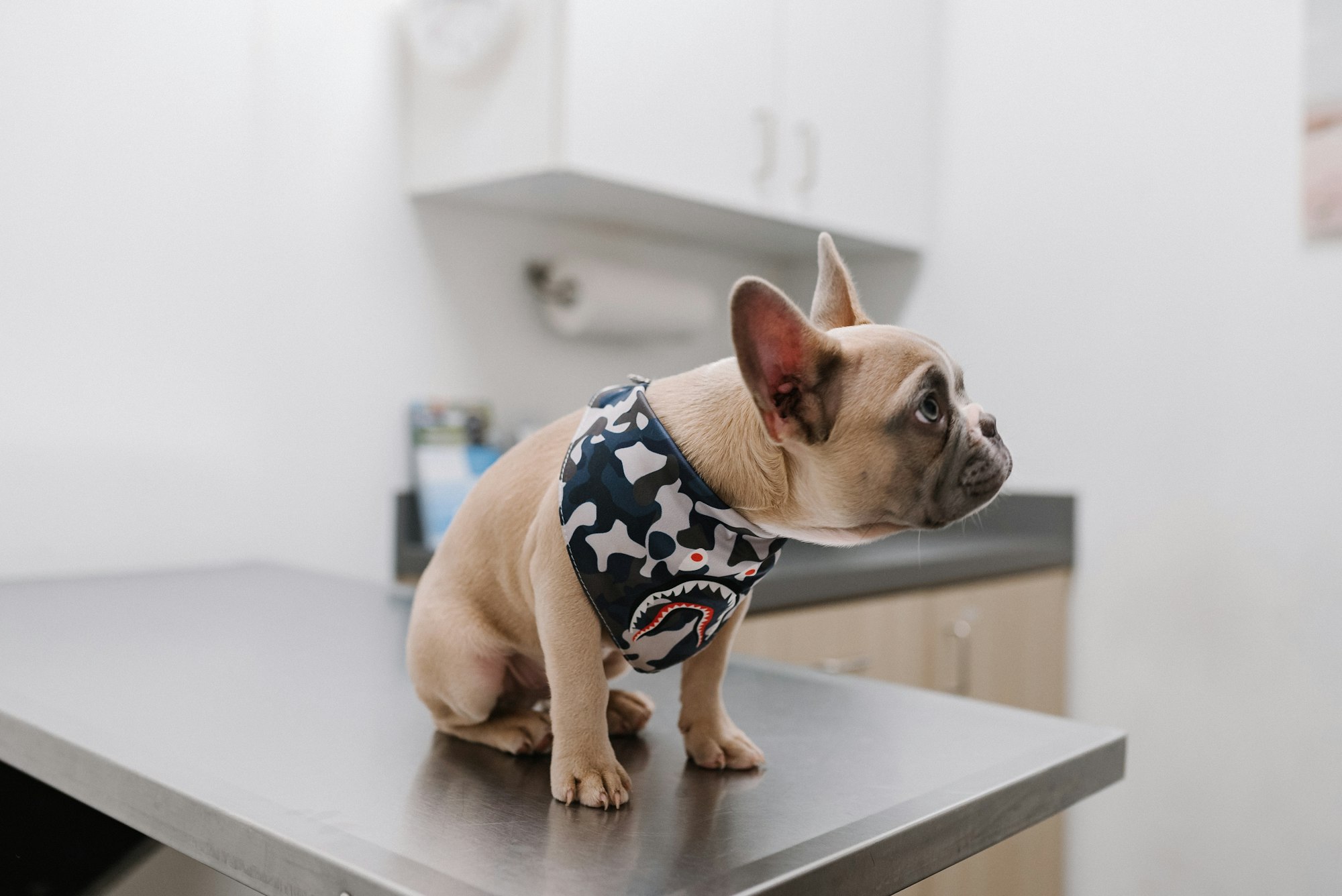Regular vet checkups are an essential aspect of responsible dog ownership. Just like humans, dogs require routine medical examinations to ensure their overall health and well-being. In this article, we will explore the importance of regular vet checkups for dogs and provide valuable insights into what to expect during these visits. From preventive care to early disease detection, we'll cover it all to help you become a better-informed pet owner.
As a loving dog owner, you want what's best for your furry companion. Regular vet checkups are not just a good practice but a crucial one to ensure your dog's health and happiness. These visits allow veterinarians to assess your dog's physical condition, detect potential issues early, and provide necessary preventive care.

Why Regular Vet Checkups Matter
Regular vet checkups are not just an option; they are a cornerstone of responsible pet ownership. Whether you're a seasoned dog owner or a newcomer to the world of canine companionship, understanding why regular vet checkups matter is crucial for the well-being of your furry friend.
Preventive Care
One of the primary reasons regular vet checkups are essential is preventive care. These visits allow your veterinarian to monitor your dog's health proactively. Just like humans, dogs can benefit from preventive measures that ward off potential health problems. During these checkups, your vet will administer vaccinations and discuss nutrition and exercise routines tailored to your dog's needs.
Preventive care goes beyond vaccinations; it encompasses a comprehensive evaluation of your dog's overall health. This includes checking for signs of early disease or conditions that may not be immediately obvious to you as a pet owner. By catching these issues early, you can often avoid more severe health complications down the road.
Early Disease Detection
Dogs are experts at concealing discomfort or illness. In the wild, displaying vulnerability could be a matter of life or death. As a result, your dog may not show obvious signs of distress until a condition has progressed significantly. Regular vet checkups can bridge this communication gap.
Your veterinarian is trained to recognize subtle changes in your dog's health. They will conduct a thorough physical examination, checking for abnormalities in the heart, lungs, eyes, ears, skin, and more. This meticulous assessment can identify underlying health issues that you might not notice until they become critical.
Early detection often translates to more effective treatment and better outcomes for your dog. It can also alleviate suffering and reduce the financial burden of treating advanced conditions.
Vaccinations and Parasite Control
Another critical aspect of regular vet checkups is ensuring that your happy dog receives the necessary vaccinations. These vaccinations protect your pet from a range of diseases, including rabies, distemper, parvovirus, and more. Vaccinations are typically administered during these visits, and your vet will keep a record to ensure your dog stays up to date.
Additionally, your veterinarian will discuss parasite control strategies. Fleas, ticks, and intestinal worms are common pests that can harm your dog's health. Regular checkups provide an opportunity to assess your dog's risk factors and implement effective preventive measures.
In conclusion, regular vet checkups are not a luxury but a fundamental responsibility for every dog owner. They are a proactive approach to maintaining your dog's health, ensuring early disease detection, and providing essential vaccinations and parasite control. By prioritizing these checkups, you are taking a significant step towards ensuring a long and happy life for your beloved canine companion.
When to Schedule Vet Checkups
Knowing when to schedule vet checkups for your dog is a crucial aspect of responsible pet ownership. The timing of these appointments can vary depending on your dog's age, health status, and specific needs. In this section, we'll outline when you should consider scheduling regular vet checkups to ensure your furry friend remains in optimal health.
Puppies
Puppies are like little sponges, absorbing knowledge and experiences rapidly. They also require more frequent vet visits during their early stages of life. Here's a general guideline for scheduling vet checkups for puppies:

- Initial Visit (6-8 Weeks): Your puppy's first vet visit should occur around 6 to 8 weeks of age. During this appointment, your veterinarian will conduct a thorough examination and administer essential vaccinations. They will also discuss deworming and guide nutrition and early puppy care.
- Follow-up Visits (Every 3-4 Weeks): Puppies grow quickly, both physically and developmentally. To ensure they receive appropriate vaccinations and preventive care, you should schedule follow-up vet visits every 3 to 4 weeks until your puppy is about 16 weeks old. These visits are vital for tracking your puppy's growth and ensuring they are on the right track.
Adult Dogs
Once your dog reaches adulthood, the frequency of vet checkups generally decreases. However, annual visits are still crucial to maintain their health. Here's what you should consider for adult dogs:
- Annual Checkup: For most adult dogs, an annual vet checkup is sufficient to monitor their overall health. During this visit, your veterinarian will conduct a comprehensive examination, update vaccinations as needed, and discuss any changes in your dog's behavior or health. Annual checkups help ensure your dog remains in optimal condition and receives preventive care.
Senior Dogs
As dogs age, they become more susceptible to certain health issues, making regular vet checkups even more critical. Senior dogs, typically those over 7 years old, benefit from more frequent visits. Here's what to keep in mind:
- Semi-Annual Checkups: Senior dogs should ideally have vet checkups every six months. These semi-annual visits allow your veterinarian to closely monitor your dog's health and address any age-related concerns promptly. Senior dogs are prone to conditions like arthritis, dental problems, and cognitive issues, so frequent checkups help manage these challenges effectively.
- Tailored Care: As your dog enters their senior years, their nutritional needs, exercise requirements, and overall care may need adjustment. Your veterinarian can provide tailored advice to ensure your senior dog enjoys the best quality of life possible.
The timing of vet checkups for your dog depends on their life stage and individual needs. Puppies require more frequent visits to support their rapid growth and development, while adult dogs benefit from annual checkups to maintain their health. Senior dogs, on the other hand, should have semi-annual checkups to address age-related concerns. Regular vet visits are the cornerstone of proactive pet care, ensuring your dog enjoys a happy and healthy life by your side.
Preparing for the Vet Visit
Getting ready for an appointment at the Spay & Neuter Clinic is essential for a seamless and fruitful session for both you and your dog. Proper preparations not only streamline the experience but also empower the veterinarian to deliver optimal care. Here's your guide to preparing for your dog's appointment at the clinic:
Documentation
- Medical Records: Gather your dog's medical records, including vaccination history, previous vet visit summaries, and any ongoing or past health concerns. Having this information on hand helps your vet understand your dog's health history.
- Medication List: Make a list of any medications your dog is currently taking, including the dosage and frequency. Be sure to include supplements and over-the-counter medications.
- Behavioral Notes: If your dog has any behavioral issues or specific triggers (e.g., fear of the vet), provide this information to your veterinarian. It helps them plan the visit and ensure a positive experience for your dog.
Questions to Ask
Prepare a list of questions or concerns you have about your dog's health, behavior, or any changes you've noticed since the last visit. Some questions to consider include:
- Are there any changes in your dog's eating habits?
- Have you noticed any lumps, bumps, or skin issues?
- Is your dog experiencing changes in behavior, such as increased anxiety or aggression?
- Are there any specific concerns or issues you'd like to address during the visit?
Having these questions ready ensures that you don't forget to discuss important matters with your vet.
What Happens During a Vet Checkup
Understanding what happens during a vet checkup can help ease any separation anxiety you or your dog may have about the appointment. These visits are designed to assess your dog's overall health and address any concerns. Here's what typically occurs during a vet checkup:
Physical Examination
The cornerstone of a vet checkup is the physical examination. Your veterinarian will perform a comprehensive assessment of your dog's body, including:
- Eyes and Ears: Checking for signs of infection, inflammation, or abnormalities.
- Mouth and Teeth: Evaluating dental health and looking for dental issues like gum disease or tooth decay.
- Heart and Lungs: Listening for any irregularities in heart and lung function.
- Skin and Coat: Inspecting for signs of allergies, parasites, or skin conditions.
- Abdomen: Palpating the abdomen to check for any pain or abnormalities in organs like the liver and kidneys.
- Limbs and Joints: Examining joints for signs of arthritis or other musculoskeletal issues.
- Weight Assessment: Monitoring your dog's weight and body condition to assess overall health and nutrition.
Vaccinations
If your dog is due for vaccinations or booster shots, your vet will administer them during the checkup. Vaccinations protect your dog from various diseases and are an essential part of preventive care.
Parasite Control
Your veterinarian will discuss and may provide treatments for common parasites like fleas, ticks, and intestinal worms. Regular preventive measures are essential to keep your dog parasite-free and healthy.
Discussion and Advice
Your vet will take the time to discuss their findings with you, address any concerns or questions you have, and offer guidance on your dog's health and well-being. This is an excellent opportunity to discuss nutrition, exercise, and any behavioral issues you've observed.
Treatment and Follow-up
If any health issues or concerns are identified during the checkup, your veterinarian will recommend a treatment plan. This may include medications, dietary changes, or additional tests. They will also schedule any necessary follow-up appointments.
By Easing fear at the vet and understanding what to expect during the checkup, you can ensure a productive and stress-free experience for both you and your furry companion. Regular vet checkups are a proactive step towards maintaining your dog's health and happiness, and they play a vital role in responsible pet ownership.
Common Health Issues
Dental Health: Oral health is essential for dogs. Your vet can advise on dental care routines and perform cleanings when necessary.
Weight Management: Maintaining a healthy weight is crucial. Your vet can help with dog food recommendations and exercise plans.
Skin and Coat Care: Skin issues can be common. Your vet will guide you on keeping your dog's skin and coat healthy.
Cost of Regular Vet Checkups
The cost of vet checkups varies depending on location and services rendered. However, the investment in your dog's health is well worth it to prevent costly treatments later.

Choosing the Right Veterinarian
Selecting a qualified and compassionate vet is vital. Ask for recommendations, read reviews, and visit prospective clinics to ensure a good fit for you and your dog.
Benefits of a Healthy Dog
A healthy dog is a happy dog. How often vet lead to a longer, happier life for your furry companion and a stronger bond between you.
Conclusion
Regular vet checkups are not just a responsibility; they are an act of love towards your dog. By prioritizing preventive care, early disease detection, and overall well-being, you can ensure your dog enjoys a healthy and joyful life by your side.
FAQs
Q1: How often should I take my dog to the vet?
A1: For adult dogs, annual checkups are generally recommended, but consult your vet for personalized guidance.
Q2: What vaccinations does my dog need?
A2: Common vaccinations include rabies, distemper, and parvovirus. Your vet will advise on specific needs.
Q3: Are regular vet checkups expensive?
A3: Costs vary, but consider them an investment in your dog's health and longevity.
Q4: Can I skip vet checkups if my dog seems healthy?
A4: Regular checkups are crucial for early disease detection, even if your dog appears healthy.
Q5: What should I do if my dog is anxious about vet visits?
A5: Discuss your concerns with your vet. They can provide strategies to ease your dog's anxiety during visits.
Prioritizing regular vet checkups for your beloved dog is a responsible and loving choice. These visits ensure your furry friend enjoys a healthy, happy life by your side. Don't hesitate to consult your veterinarian for guidance tailored to your dog's specific needs.